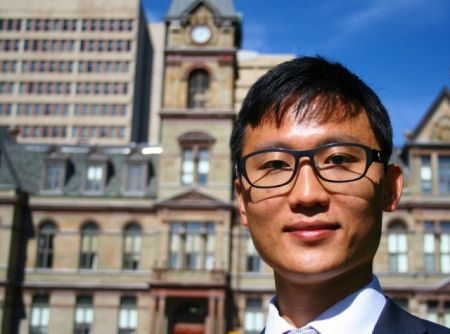Nic Lin, a recent graduate from Dalhousie University and a resident of Halifax for the last four years, is ineligible to vote in the upcoming municipal elections. But even if he were given the chance to, he does not think he would.
“Back in my home country I never voted. I’ve never had an experience in voting anywhere. I don’t know. I don’t think it affects me much.”
Lin is not alone. Nova Scotia welcomes an average of 24 000 newcomers annually – most of whom are ineligible to vote.
According to Immigration Settlement and Integration Services (ISIS) board member and coordinator, Gerry Mills, municipal politics is simply not a primary concern for many newcomers.
“If we’re talking about people who have arrived in the last few years, their priority right now is not municipal politics. It’s about being able to find work, settle their kids into schools, integrate into communities. It’s not on their list of things they want to consider,” says Mills.
While this may be the case, it would be careless to conclude that newcomers are simply disengaged or apathetic about municipal politics. Rather, newcomers face a particular set of stressors that distances them from community participation.
Dr. Howard Ramos, a Dalhousie University sociology professor with research background on immigration issues, says “It’s not disengagement. It’s a matter of not having time yet to set up full knowledge of the environment you’re in.”
The voter turnout rate for municipal elections is already very low across Canada. In 2008, only 37% of those eligible chose to vote in HRM's municipal contest.
“That’s kind of the irony,” says Ramos. “It’s not just immigrants. Native-born Canadians tend not to vote in these elections. You add any other obstacle to being able to engage in that polity and you find that [political engagement] goes down on the priority list.”
Obstacles
Newcomer groups face several such obstacles when it comes to political engagement. Language barriers are but one glaring example.
The HRM’s “Newcomer’s Guide” introduces a number of municipal services in the region that may interest those new to Halifax. But the online guide is only offered in English, French, and Arabic. Data from 2009 show that 34% of newcomers that year were from Africa and the Middle East, 28% from Europe, 25% from Asia, 9% from the United States, and 5% from Latin America.
It is clear that the guide falls short on reaching out to non-English/French/Arabic speakers.
Even Mayor Peter Kelly’s welcome note to newcomers is currently only available in English.
Language is one of the more recognizable concerns for newcomers, but the apparent disconnect between newcomers and city politics becomes more complex when one considers the quieter challenges to community participation that this group faces.
According to J, a settlement worker in the HRM whose family immigrated to Canada in the 90s and who preferred not to be identified in this story, “[p]art of it is that immigrants and newcomers are still settling in to the community, and there is a general feeling that they have to 'earn' their rights, like the right to vote, even though they pay taxes like everyone else.
“When governments tell newcomers that they can't engage in voting federally or provincially, many wonder why they should bother municipally if they're silenced in the bigger picture.”
Furthermore, there seems to be a failure on part of the HRM to publicize its services in ways that consider newcomers’ socio-cultural experiences.
“Working with newcomers, it's also apparent that public services offered in cities aren't valued as much. While clean water, roads, transit and recreational facilities are all well and good intrinsically, many newcomer families also shun public facilities and transit as alternatives due to their perception of how public facilities may have been in other parts of the world from where they've come,” says J.
Implications
With the absence of newcomer participation in municipal politics, some say Nova Scotia is alienating a group it needs for growth.
The province hopes eventually to report a 70% immigration retention rate. The 2006 census report shows that the province is currently at a 63% retention rate. Despite being relatively close to the desired goal, some are still concerned with the province’s capacity to keep immigrants in Nova Scotia.
Dr. Madine Vanderplaat, a director at the Atlantic Metropolis Center for Research on Immigration, Integration and Cultural Diversity, says that one major implication to the lack of newcomers’ voices in municipal politics is indeed the exacerbation of the province’s retention problem.
“People come here and many, many of them leave. Often it’s because of lack of employment opportunities… but just as often, I would say, it’s because people aren’t happy here. We don’t make them feel at home, we don’t make their children, spouses feel at home. People prefer to move elsewhere potentially where there are people from their particular ethnic group.”
Next Steps
J believes that multicultural events do serve as a starting point for engagement and conversation regarding newcomer issues, but it is only that – a starting point.
“The City should advocate with the province and the federal government to extend voting privileges to all permanent residents. HRM should also cater to newcomer communities by actively engaging to learn what types of programs and services they want to see in their communities...
“[M]any newcomers don't know what the city or HRM funds, maintains and upkeeps...at all. Because the bulk of your taxes go elsewhere, it is assumed that it's other levels of government that help fund our roads, garbage, water, etc.
Immigrant settlement programs are offered at the YMCA and ISIS, and refugee assistance services are provided by the Atlantic Refugee and Immigration Services and the Halifax Refugee Clinic.
But “[i]s there any political will and leadership at City Hall?” asks J.



